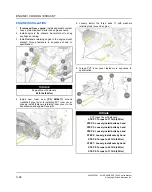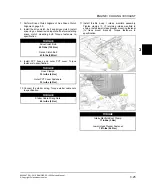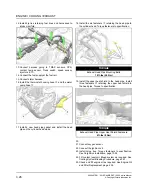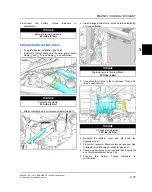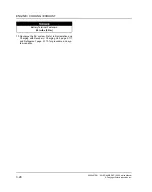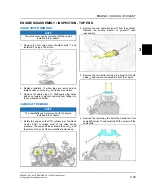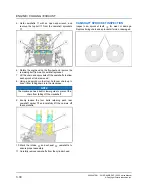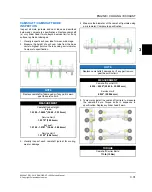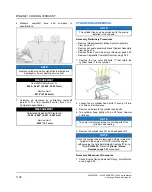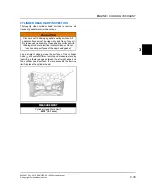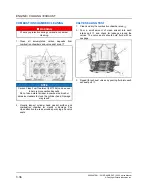
9928487 R01 - 2018 RANGER XP 1000 Service Manual
© Copyright Polaris Industries Inc.
3.37
VALVE SEAT RECONDITIONING
Valve seat reconditioning should be performed by a
technician proficient in cylinder head reconditioning
techniques. Reconditioning techniques vary, so follow
the instructions provided by the valve reconditioning
equipment manufacturer. Do not grind seats more than
necessary to provide proper seat surface, width, and
contact point on valve face.
WARNING
Wear eye protection or a face shield during cylinder
head disassembly and reassembly.
Valve Seat Inspection
Inspect valve seat in cylinder head for pitting, burnt
spots, roughness, and uneven surface. If any of the
above
conditions
exist,
the
valve
seat
must
be
reconditioned.
If the valve seat is cracked the cylinder
head must be replaced.
Valve seat width and point of contact on the valve face is
very important for proper sealing. The valve must contact
the valve seat over the entire circumference of the seat,
and the seat must be the proper width all the way
around. If seat is uneven, compression leakage will
result. If seat is too wide, seat pressure is reduced,
causing carbon accumulation and possible compression
loss. If seat is too narrow, heat transfer from valve to seat
is reduced. The valve may overheat and warp, resulting
in burnt valves.
Renewing Valve Seats
1. Install pilot into valve guide.
2. Apply cutting oil to valve seat and cutter.
3. Place 46° cutter on the pilot and make a light cut.
4. Inspect the cut area of the seat:
* If the contact area is less than 75% of the
circumference of the seat, rotate the pilot 180° and
make another light cut.
* If the cutter now contacts the uncut portion of the
seat, check the pilot. Look for burrs, nicks, or runout.
If the pilot is bent it must be replaced.
* If the contact area of the cutter is in the same place,
the valve guide is distorted from improper installation.
* If the contact area of the initial cut is greater than
75%, continue to cut the seat until all pits are
removed and a new seat surface is evident.
NOTE
Remove only the amount of material necessary to
repair the seat surface.
5. To check contact area of the seat on the valve face,
apply a thin coating of Prussian Blue™ paste to the
valve seat. If using an interference angle (46°) apply
black permanent marker to the entire valve face
q
.
6. Insert valve into guide and tap valve lightly into place
a few times.


